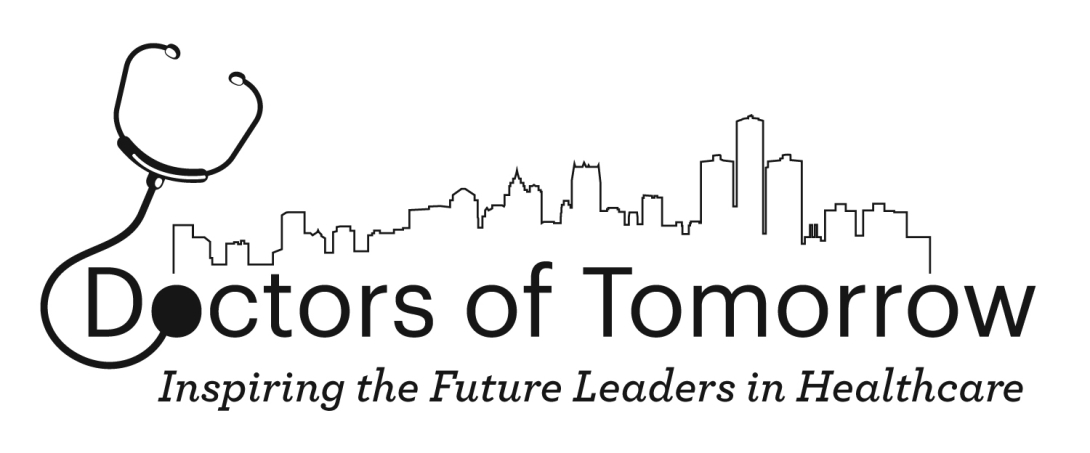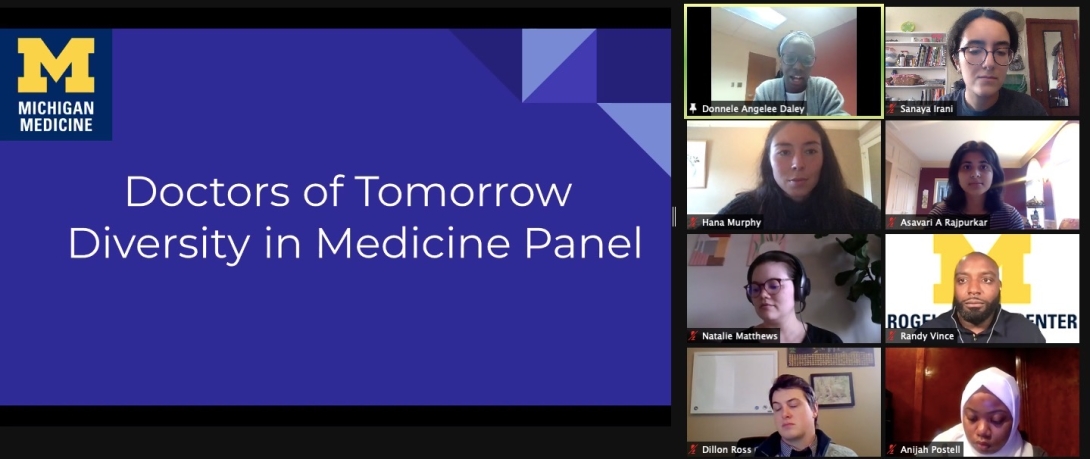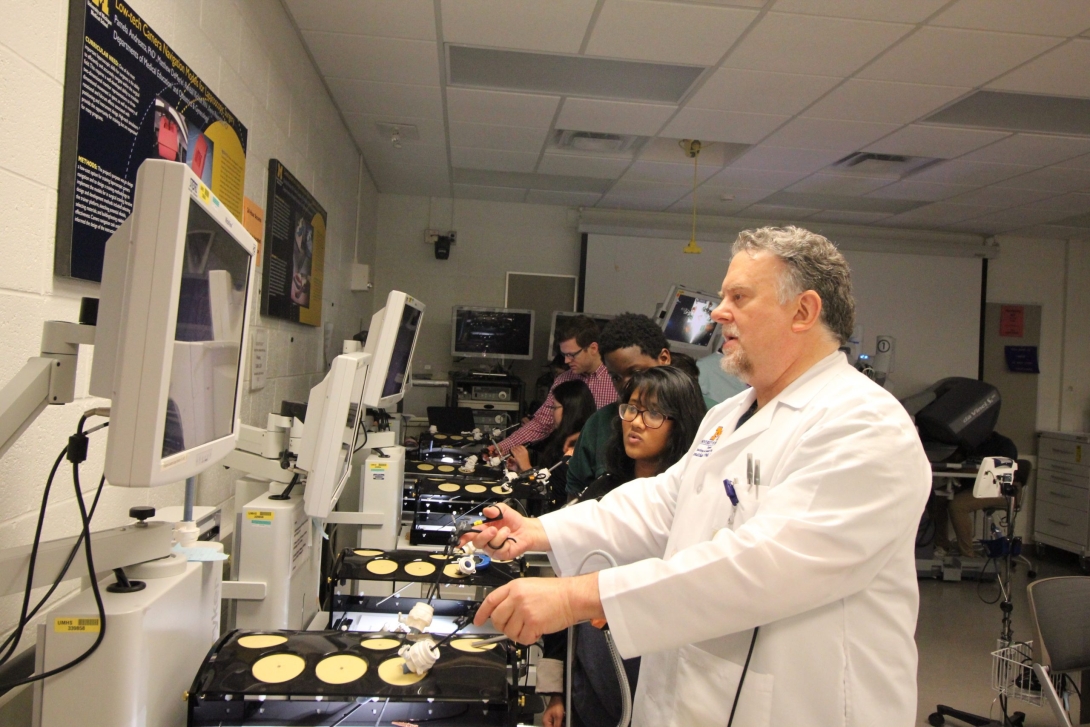5:09 PM
Author |
Josh Goyert and Hana Murphy are on the leadership team for Doctors of Tomorrow, a partnership between Cass Technical High School and the University of Michigan Medical School focused on exposing underrepresented minority students in Detroit to careers in medicine and providing mentorship to help them pursue this path.

When applying to medical school in the summer of 2019, we didn't really know what to expect from our M1 year, but we certainly did not anticipate what this past year has held. The COVID-19 pandemic has drastically altered nearly every facet of our daily lives. The traditions of how we work, learn, and live have all been upended by this virus. Yet, while COVID-19 has been challenging for all of us, it has certainly not been equally difficult for each of us. This virus has disproportionately impacted minority populations, with Black and Hispanic communities being drastically overrepresented in both hospitalizations and deaths. COVID-19 has compounded America's existing health disparities and serves as another powerful reminder of how much more work there is to be done in addressing them.
Prior to medical school, we both really enjoyed our work in youth mentorship and wanted to stay involved through programs that advanced equal opportunity in medicine. We know we wouldn't be at UMMS without the caring and selfless mentors in our lives and hoped to find a way to pay it forward and support a more diverse generation of physicians. Our shared passion for mentorship and our goal to help patch medicine's leaky pipeline led us to Doctors of Tomorrow (DoT).
DoT is a partnership between Cass Technical High School and the University of Michigan Medical School designed to increase representation in medicine by providing students from underrepresented communities mentorship and exposure to the field. DoT is split into three main cohorts: DoT Foundations (9th & 10th grade), DoT Rising (11th & 12th grade), and DoT Succeed (program alumni who matriculate at the University of Michigan for undergrad). Each cohort meets virtually twice a month where they might learn from a cardiologist teaching about heart disease, a surgeon hosting an interactive suture session, or medical students demystifying the path to medical school. Students also meet regularly with their medical student mentors and work in groups on longitudinal capstone projects to solve community health issues. The goal of these sessions is to expose students to different fields in medicine so that they can better visualize a career in health care.
[embed]https://www.youtube.com/watch?v=3eosmU2aIHY&feature=youtu.be[/embed]
Hana: As Director of DoT Rising, I organize educational sessions with Michigan Medicine physicians, create programming to outline career paths in health care, and provide guidance and facilitate essay support throughout the college application process. Our most recent session, "Diversity in Medicine: Representation Matters" included physicians Dr. Donnele Daley and Dr. Randy Vince, who shared with DoT students their career paths, life obstacles, and experiences as a BIPOC individual in the medical field. Their guidance and genuine life perspective I could tell struck a chord with students, helping them to see what the road to medicine might look like. Dr. Vince's powerful reminder that "it's extremely hard to become what you can never see," serves as a testament to the importance of programs like Doctors of Tomorrow. How can we hope to diversify, and thus improve, health care if the talent we need most is never exposed?

DoT Rising Diversity in Medicine Panel, January 2021
Josh: Alongside Hana, I work as the Director of Capstone. Each month, we meet to work on students' community health projects and continue to build on their public speaking and research abilities. Despite hours of "Zoom school," DoT students show up eager and driven to complete capstone projects that address issues important to them. Our initial brainstorming sessions evolved into student-led discussions that spanned racial disparities in preterm labor to environmental racism and its impact on health outcomes. Their conversations were impassioned and persuasive. It was clear that their research projects had the potential to result in real change. To support their efforts, we sought out individuals well-positioned to help implement their ideas. With the help of Wayne County Commissioner Joseph Palamara, we were introduced to Michigan State Representative Clemente who has agreed to review and respond to DoT student proposals. Providing channels for civic engagement and community service supports DoT's mission to prepare students to become future leaders in health care.

Dr. Finks demonstrating surgical techniques in the UMMS Clinical Simulation Center, December 2019
Josh & Hana: The failure of our health care system to produce physicians that represent their patients is not simply a moral failure, but it propagates the very disparities it seeks to address. While only 14% of the population, Black Americans have accounted for up to 48% of COVID-related deaths in Michigan. Although the health care industry is not solely responsible for this discrepancy, the tragic death of Dr. Susan Moore, a UMMS alumnus, demonstrates acutely how the medical field continues to fail Black patients. Doctors of Tomorrow aims to increase diversity by promoting educational opportunities in communities that have traditionally been excluded from medicine. A more diverse medical workforce will ensure that patients are able to see providers who more thoroughly understand their perspectives, which can result in increased patient satisfaction and more positive health outcomes. While increasing representation in medicine is necessary, it will not be sufficient to eradicate the health disparities that have long plagued the United States. Significant institutional change is required to effectively eliminate the health disparities that exist today.
Medical students leading interactive physiology lessons on Clinical Skills Day, February 2020
The incorporation of anti-racism components into medical school curriculums is a start to addressing these disparities, but this education without action leads to little progress. Advocacy is not a sideline sport, and all of us have a role to play. Medical students in particular are in a unique position to advocate for a more equitable future. For us, Doctors of Tomorrow was a means to translate words into action. We encourage current and future medical students to find meaningful opportunities that allow them to contribute to a more equitable future in medicine.

University of Michigan Medical School
Want top health & research news weekly? Sign up for Health Lab’s newsletters today!





